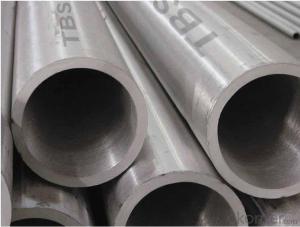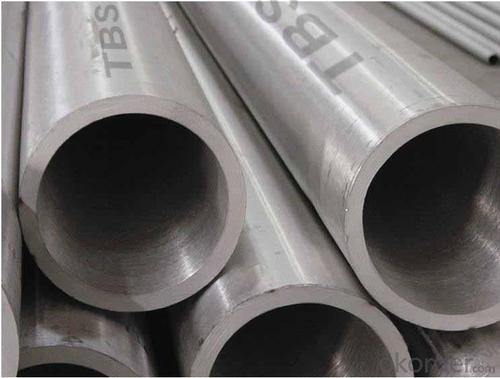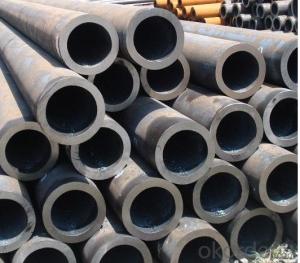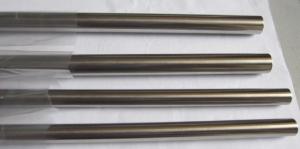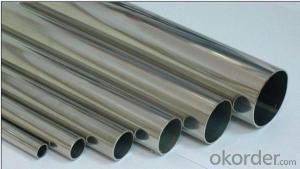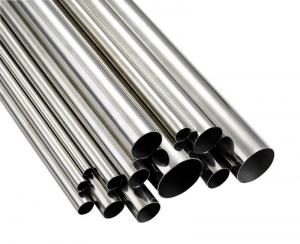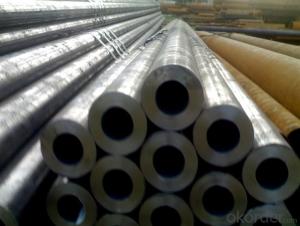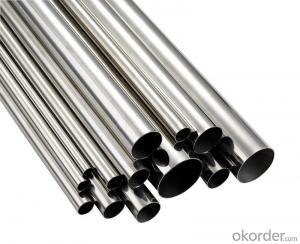P5 Seamless Ferritic Alloy-Steel Pipe for High-Temperature Service
- Loading Port:
- Shanghai
- Payment Terms:
- TT OR LC
- Min Order Qty:
- 1000 kg
- Supply Capability:
- 10000 kg/month
OKorder Service Pledge
OKorder Financial Service
You Might Also Like
ASTM A335 Seamless Alloy-Steel Pipe
Standard: BS 1139, BS 3059-2, JIS G3454-2007
Grade: 10#-45#, 15NiCuMoNb5, 10Cr9Mo1VNb
Detailed introduction to ASTM A335 seamless alloy steel pipe:
ASTM A335 seamless alloy steel pipe
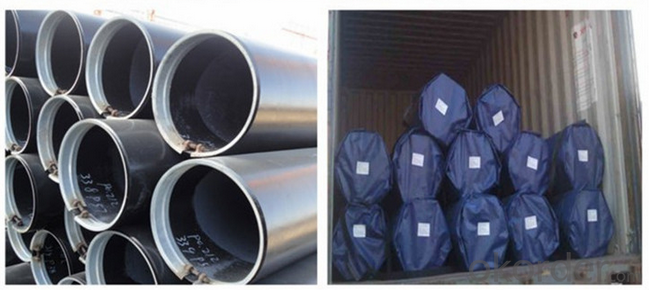
Packaging Detail: | Bundle or Container or as per customers requirement. |
Delivery Detail: | within 25 days after we receive an irrevocable L/Cor 30% deposit |
ASTM A335 Seamless Alloy-Steel Pipe
Standard: BS 1139, BS 3059-2, JIS G3454-2007
Grade: 10#-45#, 15NiCuMoNb5, 10Cr9Mo1VNb
Detailed introduction to ASTM A335 seamless alloy steel pipe:
ASTM A335 seamless alloy steel pipe

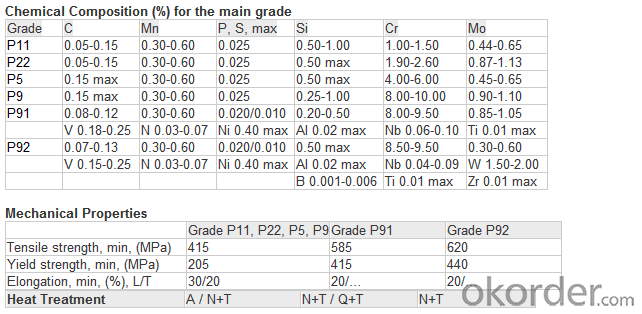
FAQ:
1) why you chose us ?
Professional Manufacturer and supplier of Steel pipe
More than 14 years’ professional producing experience
We can get the lowest ex-factory prices. The price are quite reasonable and it is lower than our commercial peers. also, we can guarantee the qualities of our products.
BV, ISO certificates and SGS test can be provided to assure the quality of our products.
2) Our minimum order quantity:
10 Metric Tons or one 20ft or 40ft Container.
3) How about the Delivery Time?
The steel pipe will be produced since we getting your deposit by T/T or Your original L/C. For normal size, some stocks in our factory now, we can supply once you need.
4)What kind of payment does your company support?
T/T, 100% L/C at sight, Cash, Western Union are all accepted.
5) Do you charge for the samples?
According to our company principle, we just charge for samples, you pay for the freight /courier charge.
6) Main market:
Mid East, South America, Africa, Southeast Asia, India etc
FAQ:
1) why you chose us ?
Professional Manufacturer and supplier of Steel pipe
More than 14 years’ professional producing experience
We can get the lowest ex-factory prices. The price are quite reasonable and it is lower than our commercial peers. also, we can guarantee the qualities of our products.
BV, ISO certificates and SGS test can be provided to assure the quality of our products.
2) Our minimum order quantity:
10 Metric Tons or one 20ft or 40ft Container.
3) How about the Delivery Time?
The steel pipe will be produced since we getting your deposit by T/T or Your original L/C. For normal size, some stocks in our factory now, we can supply once you need.
4)What kind of payment does your company support?
T/T, 100% L/C at sight, Cash, Western Union are all accepted.
5) Do you charge for the samples?
According to our company principle, we just charge for samples, you pay for the freight /courier charge.
6) Main market:
Mid East, South America, Africa, Southeast Asia, India etc
- Q: Are steel pipes resistant to corrosion?
- Yes, steel pipes are generally resistant to corrosion due to their composition, which includes a protective layer of zinc or other anti-corrosion coatings. However, factors such as exposure to harsh environments or chemicals can affect the level of corrosion resistance.
- Q: Is steel pipe made of profiles?
- In accordance with the different smelting quality of steel, steel is divided into ordinary steel and high quality steel. According to the current catalogue of metal products, ordinary steel can be divided into large section steel, medium section steel and small section steel. The section steel can be divided into I-beam, channel steel, angle steel, round steel and so on according to its sectional shape.
- Q: How do steel pipes handle thermal expansion and contraction?
- Steel pipes handle thermal expansion and contraction by allowing for slight movement and flexibility. When heated, the steel pipe expands, and when cooled, it contracts. To accommodate these changes, expansion joints or loops are often incorporated into the pipe system. These joints or loops allow the pipe to expand and contract without causing stress or damage. Additionally, proper insulation and support are essential to minimize the effects of thermal expansion and contraction on steel pipes.
- Q: What are the different types of steel pipes available?
- There are various types of steel pipes available in the market, each designed to meet specific requirements in different applications. Some of the commonly used types of steel pipes include: 1. Carbon Steel Pipes: These are the most common type of steel pipes and are primarily made of carbon. They are used in a wide range of applications, including transportation of fluids and gases, structural applications, and plumbing. 2. Stainless Steel Pipes: These pipes are made of an alloy that contains a high percentage of chromium, which provides excellent corrosion resistance. Stainless steel pipes are widely used in industries such as oil and gas, chemical processing, and food processing. 3. Alloy Steel Pipes: As the name suggests, these pipes are made of an alloy that contains a combination of different elements, such as chromium, molybdenum, and nickel. Alloy steel pipes offer enhanced strength, durability, and resistance to high temperatures, making them suitable for applications in power plants, refineries, and petrochemical industries. 4. Galvanized Steel Pipes: These pipes are coated with a layer of zinc to protect them from corrosion. Galvanized steel pipes are commonly used in plumbing systems, water supply lines, and outdoor structures due to their excellent resistance to rust and long-lasting durability. 5. Seamless Steel Pipes: These pipes are manufactured without any welding seam and are often preferred for applications that require high pressure, high temperature, or a smooth inner surface. Seamless steel pipes are commonly used in industries such as oil and gas, automotive, and aerospace. 6. Welded Steel Pipes: These pipes are manufactured by welding two pieces of steel together. They are available in various shapes and sizes and are commonly used in construction, water supply systems, and general engineering applications. 7. ERW (Electric Resistance Welded) Steel Pipes: These pipes are manufactured by passing a high-frequency electric current through the steel strip and then welding the edges together. ERW steel pipes are widely used in oil and gas transportation, structural applications, and fencing. 8. LSAW (Longitudinal Submerged Arc Welded) Steel Pipes: These pipes are made by bending and welding a steel plate into a cylindrical shape. LSAW steel pipes are commonly used in large-scale infrastructure projects, such as oil and gas pipelines and bridge construction. In summary, the different types of steel pipes available include carbon steel pipes, stainless steel pipes, alloy steel pipes, galvanized steel pipes, seamless steel pipes, welded steel pipes, ERW steel pipes, and LSAW steel pipes. The choice of steel pipe type depends on the specific requirements of the application, including factors such as corrosion resistance, strength, temperature, and pressure resistance.
- Q: What are the different types of couplings used with steel pipes?
- There are several types of couplings that can be used with steel pipes, including threaded couplings, compression couplings, and flanged couplings. Threaded couplings have threads on the inside and outside that allow pipes to be screwed together. Compression couplings use a compression fitting to connect pipes, providing a tight and secure connection. Flanged couplings have flanges on each end that are bolted together, creating a strong and durable joint.
- Q: Can steel pipes be used for electrical conduits?
- No, steel pipes are not suitable for use as electrical conduits. Electrical conduits are typically made of materials such as PVC (polyvinyl chloride) or metal conduits specifically designed for electrical applications.
- Q: How are steel pipes used in the transportation of fluids?
- Steel pipes are commonly used in the transportation of fluids due to their high strength and durability. They are used in various industries, including oil and gas, water supply, and sewage systems. Steel pipes are ideal for fluid transportation as they can handle high pressure and are resistant to corrosion. They are used to transport liquids and gases over long distances, ensuring a safe and efficient flow of fluids.
- Q: What is the maximum allowable pressure for steel pipes?
- The maximum allowable pressure for steel pipes typically depends on various factors such as the pipe's diameter, thickness, and material grade. Additionally, it is crucial to consider the intended application and the specific industry standards or codes being followed. Therefore, there is no universal answer to this question, as the maximum allowable pressure can vary significantly depending on these factors. It is essential to consult relevant codes and standards specific to the application to determine the appropriate maximum allowable pressure for steel pipes.
- Q: What are the different methods of pipe support for steel pipes?
- There are several different methods of pipe support for steel pipes, each designed to ensure the stability, alignment, and protection of the pipes. Some of the most commonly used methods include: 1. Pipe Hangers: These are devices that suspend or support the weight of the pipe from above. They are typically made of metal and can be adjustable or fixed, allowing for easy installation and maintenance. Pipe hangers can be used in various configurations, such as clevis hangers, beam clamps, or pipe rollers, depending on the specific application. 2. Pipe Shoes: These are supports that are directly attached to the bottom of the pipe, providing a stable resting surface. Pipe shoes are usually made of steel or other durable materials and are designed to prevent pipe movement, absorb vibrations, and distribute the weight evenly. They are commonly used in applications where pipes are subjected to high temperatures or where there is a need for thermal expansion. 3. Pipe Clamps: These are devices used to hold or fasten the pipes together or to a structure. Pipe clamps are typically made of metal and come in various sizes and designs to accommodate different pipe diameters and configurations. They provide support and prevent the pipes from sagging or moving, especially in areas where there are changes in direction or elevation. 4. Pipe Racks: These are structures that are specifically designed to support multiple pipes in an organized and secure manner. Pipe racks are commonly used in industrial settings, such as refineries or power plants, where large quantities of pipes need to be stored or supported. They are typically made of steel and can be customized to accommodate different pipe sizes and layouts. 5. Pipe Guides: These are devices that help guide and control the movement of the pipe, especially during thermal expansion or contraction. Pipe guides are typically fixed to the structure and provide a sliding surface to allow for the longitudinal movement of the pipe. They are commonly used in applications where there are changes in temperature, such as in steam or hot water systems. These are just a few of the many methods of pipe support for steel pipes. The choice of support method depends on factors such as pipe size, weight, temperature, and the specific requirements of the application. It is crucial to select the appropriate support method to ensure the longevity and integrity of the pipes and to prevent any potential issues such as sagging, misalignment, or failure.
- Q: Galvanized steel pipe, PPR pipe, PE pipe, U-PVC pipe and HDPE double wall corrugated pipe and what is the difference between the characteristics of
- U-PVC tubes are hard poly vinyl pipes, because they contain chlorine, so they are mainly used in sewer pipes or electrical wiring;HDPE double wall corrugated pipe is a high-density polyethylene pipe, because of its excellent electrical insulation performance, now mainly used for distribution line arrangement.
Send your message to us
P5 Seamless Ferritic Alloy-Steel Pipe for High-Temperature Service
- Loading Port:
- Shanghai
- Payment Terms:
- TT OR LC
- Min Order Qty:
- 1000 kg
- Supply Capability:
- 10000 kg/month
OKorder Service Pledge
OKorder Financial Service
Similar products
Hot products
Hot Searches
Related keywords
